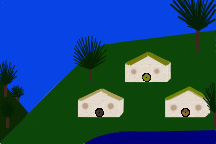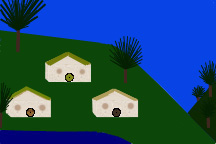 |
|
 |
 |
|
 |
Concerning Hobbits | Calendars & Chronologies | Shire Library>Other Verses | Shire Geography | Mathom House (Misc) | Home
Goblin Feet
(In Tolkien's undergraduate days he saw goblins as tiny elf-like creatures who made magic when they sang and danced. The following early poem follows that conception of goblins)
(This is from The Annotated Hobbit p. 113 - 114.)
I am off down the road
Where the fairy lanterns glowed
And the pretty little flittermice are flying:
A slender band of grey
It runs creepily away
And the hedges and the grasses are a-sighing.
The air is full of wings,
And of blundering bettle-things
That warn you with their whirring and their humming.
O! I hear the tiny horns
Of enchanted leprechauns
And the padding feet of many gnomes a-coming!
O! the lights: O! the gleams: O! the little tinkly sounds:
O! the rustle of their noiseless little robes:
O! the echo of their feet - of their little happy feet:
O! their swinging lamps in little starlit globes.
I must follow in their train
Down the crooked fairy lane
Where the coney-rabbits long ago have gone,
And where silverly they sing
In a moving moonlit ring
All a-twinkle with the jewels they have on.
They are fading round the turn
Where the glow-worms palely burn
And the echo of their padding feet is dying!
O! it's knocking at my heart -
Let me go! O! let me start!
For the little magic hours are all a-flying.
O! the warmth! O! the hum! O! the colours in the dark!
O! the gauzy wings of golden honey-flies!
O! the music of their feet - of their dancing goblin feet!
O! the magic! O! the sorrow when it dies!
(At one point Tolkien wrote that he hated this poem. But later he seemed about to publish it in a collection of his poetry which, unfortunately, never made it to publication.)
Glip
(Glip was an early forerunner of Gollum. Gollum is an inflected form of goll or gull, which is Old Norse for "gold". Gollum could mean "gold, treasure, something precious", or "ring".)
(From The Annotated Hobbit p. 119 - 120).
Under the cliffs of Bimble Bay
Is a little cave of stone
With wet walls of shining grey;
And on the floor a bone,
A white bone that is gnawed quite clean
With sharp white teeth.
But inside nobody can be seen -
He lives far underneath,
Under the floor, down a long hole
Where the sea gurgles and sighs.
Glip is his name, as blind as a mole
In his two round eyes
While daylight lasts; but when night falls
With a pale gleam they shine
Like green jelly, and out he crawls
All long and wet with slime.
He slinks through weeds at highwater mark
To where the mermaid sings,
The wicked mermaid singing in the dark
And threading golden rings
On wet hair; for many ships
She draws to the rock to die.
And Glip listens, and quietly slips
And lies in shadow by.
It is there that Glip steals his bones.
He is a slimy little thing,
Sneaking and crawling under fishy stones,
And slinking home to sing
A gurgling song in his damp hole;
But after the last light
There are darker and wickeder things that prowl
On Bimble rocks at night.
The Dragon's Visit
(Published in the Oxford Magazine in February 1937. From The Annotated Hobbit. p. 309-312).
The dragon lay on the cherry trees
a-simmering and a-dreaming:
Green was he, and the blossom white,
and the yellow sun gleaming.
He came from the land of Finis-Terre,
from over the Blue Mountains,
Where dragons live, and the moon shines
on high white fountains.
"Please, Mister Higgins, do you know
What's a-laying in your garden?
There's a dragon in your cherry tree!"
"Eh, what? I beg your pardon?"
Mister Higgins fetched the garden hose,
and the dragon woke from dreaming;
He blinked, and cocked his long green ears
when he felt the water streaming.
"How cool," he said, "delightfully cool
are Mister Higgins' fountains!
I'll sit and sing till the moon comes,
as they sing beyond the mountains;
And Higgins, and his neighbours, Box,
Miss Biggins and old Tupper,
Will be enchanted by my voice:
they will enjoy their supper!"
Mister Higgins sent for the fire brigade
with a long red ladder.
And men with golden helmets on.
The dragon's heart grew sadder:
"It reminds me of the bad old days
when warriors unfeeling
Used to hunt dragons in their dens,
their bright gold stealing."
Captain George, he up the ladder came.
The dragon said: "Good people,
Why all this fuss? Please go away!
Or your church-steeple
I shall throw down, and blast your trees,
and kill and eat for supper
You, Cap'n George, and Higgins, Box,
and Biggins and old Tupper!"
"Turn on the hose!" said Captain George,
and down the ladder tumbled.
The dragon's eyes from green went red,
and his belly rumbled.
He steamed, he smoked, he threshed his tail,
and down the blossom fluttered;
Like snow upon the lawn it lay,
and the dragon growled and muttered.
They poked with poles from underneath
(where he was rather tender):
The dragon gave a dreadful cry
and rose like thunder.
He smashed the town to smithereens,
and over the Bay of Bimble
Sailors could see the burning red
from Bumpus Head to Trimble.
Mister Higgins was tough; and as for Box
just like his name he tasted.
The dragon munching his supper said:
"So all my trouble's wasted!"
And he buried Tupper and Captain George,
and the remains of old Miss Biggins,
On a cliff above the long white shore;
and he sang a dirge for Higgins.
A sad song, while the moon rose,
with the sea below sighing
On the grey rocks of Bimble Bay,
and the red blaze dying.
For over the sea he saw the peaks
round his own land ranging;
And he mused on the folk of Bimble Bay
and the old order changing:
"They have not got the wit to admire
a dragon's song or colour,
Nor heart to kill him brave and quick -
the world is getting duller!"
And the moon shone through his green wings
the night winds beating,
And he flew back over the dappled sea
to a green dragon's meeting.
(Tolkien revised the poem and tried to improve it and make it fit into the Lord of the Rings universe so that he could include the poem in The Adventures of Tom Bombadil. But he was unable to make the poem fit. In a later version, the dragon does not kill Miss Biggins. The poem ends:)
"None of them now have the wit to admire
a dragon's song or colour,
Nor the nerve with steel to meet his fire -
the world is getting duller!"
He spread his wide wings to depart;
but just as he was rising
Miss Biggins stabbed him to the heart,
and that he found surprising.
"I regret this very much," she said.
"You're a very splendid creature,
And your voice is quite remarkable
for one who has had no teacher;
But wanton damage I will not have,
I really had to end it."
The dragon sighed before he died:
"At least she called me splendid."
Iumonna Gold Galdre Bewunden
(This was an early version of the poem later titled "The Hoard" and published in The Adventures of Tom Bombadil. From The Annotated Hobbit p. 335 - 337.)
There were elves olden and strong spells
Under green hills in hollow dells
They sang o'er the gold they wrought with mirth,
In the deeps of time in the young earth,
Ere Hell was digged, ere the dragon's brood
Or the dwarves were spawned in dungeons rude;
And men there were in a few lands
That caught some cunning of their mouths and hands.
Yet the doom came and their songs failed,
And greed that made them not to its holes haled
Their gems and gold and their loveliness,
And the shadows fell on Elfinesse.
There was an old dwarf in a deep grot
That counted the gold things he had got,
That the dwarves had stolen from men and elves
And kept in the dark to their gloomy selves.
His eyes grew dim and his ears dull,
And the skin was yellow on his old skull;
There ran unseen through his bony claw
The faint glimmer of gems without a flaw.
He heard not the feet that shook the earth,
Nor the rush of wings, not the brazen mirth
Of dragons young in their fiery lust:
His hope was in gold and in jewels his trust.
Yet a dragon found his dark cold hole,
And he lost the earth and the things he stole.
There was an old dragon under an old stone
Blinking with red eyes all alone.
The flames of his fiery heart burnt dim;
He was knobbed and wrinkled and bent of limb;
His joy was dead and his cruel youth,
But his lust still smouldered and he had not ruth,
To the slime of his belly the gems stuck thick
And his things of gold he would snuff and lick
As he lay thereon and dreamed of the woe
And grinding anguish thieves would know
That ever set a finger on one small ring;
And dreaming uneasy he stirred a wing.
He heard not the step nor the harness clink
Till the fearless warrior at his cavern's brink
Called him come out and fight for his gold,
Yet iron rent his heart with anguish cold.
There was an old king on a high throne:
His white beard was laid on his knees of bone,
And his mouth savoured not meat nor drink,
Nor his ears song, he could only think
Of his huge chest with carven lid
Where the gold and jewels unseen lay hid
In a secret treasury in the dark ground,
Whose mighty doors were iron-bound.
The swords of his warriors did dull and rust,
His glory was tarnished and his rule unjust,
His halls hollow and his bowers cold,
But he was king of elfin gold.
He heard not the horns in the mountain pass,
He smelt not the blood on the trodden grass,
Yet his halls were burned and his kingdom lost,
In a grave unhonoured his bones were tossed.
There is an old hoard in a dark rock
Forgotten behind doors none can unlock.
The keys are lost and the path gone,
The mound unheeded that the grass grows on;
The sheep crop it and the larks rise
From its green mantle, and no man's eyes
Shall find its secret, till those return
Who wrought the treasure, till again burn
The lights of Faery, and the woods shake,
And songs long silent once more awake.
Visit our smial (home)